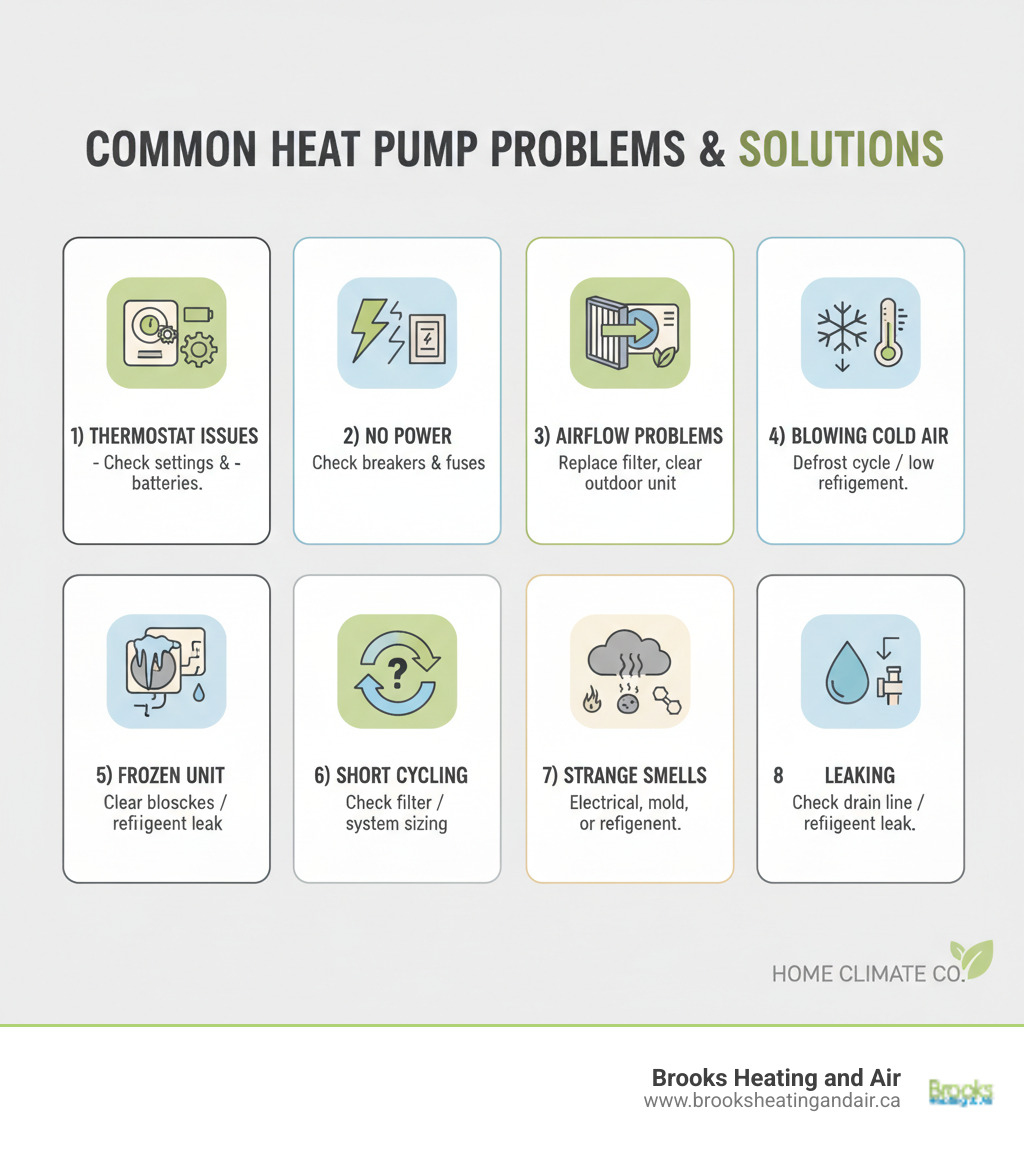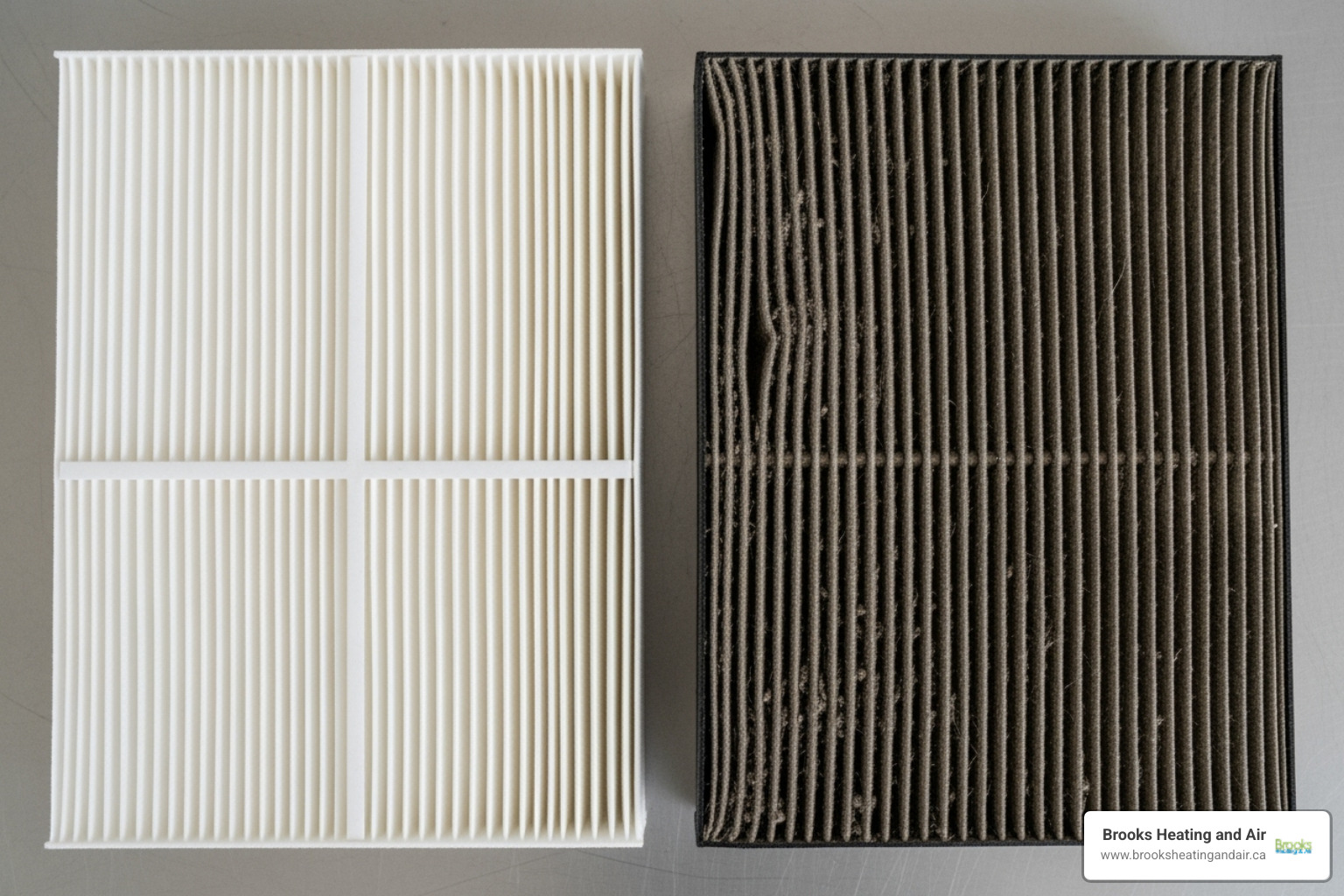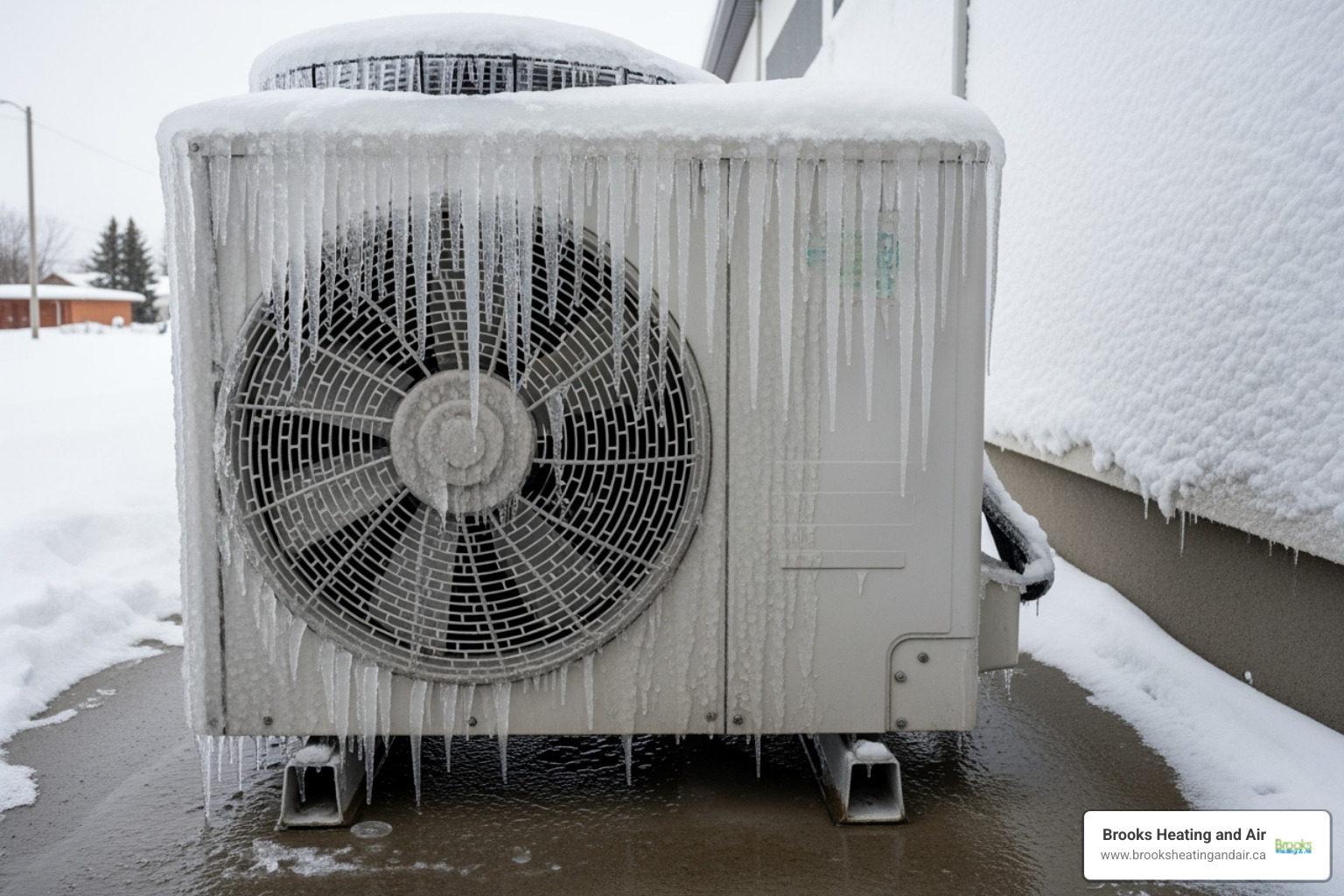Is Your Heat Pump Acting Up? Simple Fixes to Get It Running
When Your Home's Comfort System Stops Cooperating
Heat pump troubleshooting starts with understanding the most common issues. When your heat pump stops working on a frigid winter night or sweltering summer day, it's frustrating. The good news is that many problems fall into a few simple categories you can check yourself before calling a professional.
Quick Troubleshooting Checklist:
- Check your thermostat - Verify it's set to the correct mode (heat/cool), the temperature is appropriate, and the batteries aren't dead.
- Verify power - Look for tripped breakers or blown fuses at your electrical panel.
- Inspect the air filter - A clogged filter is one of the most common causes of heat pump issues.
- Clear the outdoor unit - Remove debris, leaves, or snow blocking airflow.
- Listen for unusual sounds - Grinding, squealing, or constant clicking indicates a problem.
- Check for leaks - Look for water or oily residue around your unit.
- Watch for ice buildup - Thick ice (beyond normal defrost cycles) signals an issue.
Heat pumps are remarkable machines that both heat and cool your home by transferring heat energy rather than generating it. This dual functionality makes them incredibly efficient, but like any HVAC system, they're subject to wear and tear.
This guide will walk you through the most common heat pump problems, from simple fixes like checking your thermostat to more serious issues like refrigerant leaks. You'll learn when you can troubleshoot yourself and when it's time to call a professional.

First Steps: What to Check Before You Panic
Before calling a technician, a few simple checks can often solve the problem, saving you time and money. These steps cover the most common culprits when your heat pump isn't working.
Check Your Thermostat Settings
Your thermostat is the control center for your HVAC system, and incorrect settings are a frequent cause of issues. Start by checking these four things:
- Correct Mode: Ensure the thermostat is set to "Heat" for heating or "Cool" for cooling, not "Off."
- Temperature Setting: For heating, the set temperature must be higher than the current room temperature. For cooling, it must be lower.
- Fan Setting: Set the fan to "Auto," not "On." The "Auto" setting runs the fan only when the system is actively heating or cooling, saving energy. The "On" setting runs the fan constantly.
- Batteries: If the thermostat display is dim or blank, replace the batteries.
A smart thermostat can help maintain consistent settings. For homes with multiple zones, check each thermostat individually. Our guide on Heat Pump Zoning Solutions for Properties explains how to manage these systems.
Verify Power to the Unit
If your heat pump shows no signs of life (no sounds, no fan), a power issue is the likely culprit. Here's how to check:
- Circuit Breakers: Go to your main electrical panel and look for tripped breakers. A heat pump usually has two: one for the indoor unit and one for the outdoor unit. To reset a tripped breaker, flip it fully to "Off" and then back to "On."
- Fuses: Older homes may have fuses. A blown fuse must be replaced with a new one of the same amperage. If you're unsure, call a professional.
- Outdoor Disconnect Switch: Near the outdoor unit is a disconnect box with a switch or pull-out block. Ensure it is in the "On" position.
If these checks don't work, try a full system reset. Turn off the power at the circuit breaker and the outdoor disconnect. Wait five minutes, then turn the power back on. This can resolve minor electrical faults.
Inspect the Air Filter and Coils
A clogged air filter is one of the most common causes of heat pump failure. It restricts airflow, forcing the system to work harder, reducing efficiency, and potentially causing it to overheat and shut down. Signs of a clogged filter include weak airflow from vents, the system running constantly, or a musty smell.

Dirty coils on the indoor and outdoor units also hinder performance. When covered in grime, coils cannot transfer heat effectively, leading to poor heating/cooling and higher energy bills.
To check your air filter, locate it in the return air duct or air handler, pull it out, and hold it to the light. If you can't see light through it, it's time for a replacement. Check your filter monthly and replace it every 1-3 months. Homes with pets or in dusty areas may need more frequent changes, as Consumer Reports explains.
Regular filter changes are the most important DIY maintenance task. For more tips, see our guide on How to Handle Heat Pump Maintenance.
Solving Common Performance Problems
If the basic checks don't solve the issue, it's time to look at specific symptoms. These common performance problems can often point to a more specific cause, guiding your heat pump troubleshooting efforts.
Heat Pump is Blowing Cold Air in Heat Mode
Feeling cold air from your vents when the heat is on can be alarming, but it's not always a major issue. Here are the common causes:
- Defrost Cycle: This is a normal function. To prevent ice buildup on the outdoor coil in cold weather, your heat pump briefly reverses to a cooling mode to melt the ice. You may feel cooler air for a few minutes. If the Heat Pump Defrost Not Working, it requires attention.
- Low Refrigerant: If the system constantly blows cold air, it could be due to low refrigerant. A leak prevents the system from transferring heat effectively and needs professional repair.
- Reversing Valve Issue: This component switches the system between heating and cooling. If it's stuck, the unit may be cooling when it should be heating.
- Thermostat Settings: Double-check that the thermostat is set to "Heat" and the temperature is set higher than the current room temperature.
Outdoor Unit is Blocked or Frozen
The outdoor unit needs clear airflow to function. If it's blocked or frozen, performance will suffer.

First, check for blockages. Clear away leaves, snow, or debris, ensuring at least two feet of clearance on all sides. A blocked unit can't pull in enough air, reducing efficiency and potentially causing it to freeze.
Next, check for ice. A thin layer of frost that melts during the defrost cycle is normal. However, a thick layer of ice that persists for hours is a sign of a problem. This can be caused by low refrigerant, a dirty air filter, a faulty fan motor, or leaky gutters dripping water onto the unit.
Warning: Never use sharp tools to chip ice off the unit, as this can damage the coils. If the ice doesn't melt on its own, call a professional. This issue can also be why your Heat Pump Not Cooling.
Indoor Air Handler Isn't Working
The indoor air handler circulates conditioned air. If there's no airflow from your vents, even when the outdoor unit is running, the air handler may be the issue. Here's what to check:
- Circuit Breaker: The indoor unit has its own circuit breaker. Check your electrical panel for a tripped breaker and reset it.
- Blower Motor: If the breaker is fine, the blower motor may have failed. This is a mechanical issue that requires a professional.
- Clogged Air Filter: A severely clogged filter can restrict airflow so much that the blower motor overheats and shuts down.
For persistent indoor unit issues, our team can diagnose and fix the problem. Learn more about Problems Fixed by Heat Pump Technicians.
Unit is Leaking Liquid
A puddle near your heat pump can be alarming, but the cause depends on the liquid.
- Water: A small amount of water is usually normal condensation. However, a large puddle often indicates a clogged condensate drain line or a cracked drain pan. You may be able to clear a minor clog, but a cracked pan needs professional replacement.
- Oily Fluid: If the liquid is oily and has a chemical smell, it's likely a refrigerant leak. This is a serious issue that requires immediate professional service due to safety and environmental risks.
For more on leaks, see our guide on How to Fix Mini Split AC Water Leaks.
Advanced Heat Pump Troubleshooting: Alarming Signs to Watch For
Some symptoms are clear indicators of a more serious problem that may require professional attention. Don't ignore these warning signs, as they can lead to more significant damage if left unaddressed.
Short Cycling
Short cycling is when your heat pump turns on and off every few minutes instead of completing a normal 10-15 minute cycle. This frequent starting and stopping puts excessive wear on the compressor, increases energy bills, and shortens the system's lifespan.
Common causes include:
- Clogged Air Filter: Restricted airflow can cause the system to overheat and shut down prematurely.
- Oversized System: A heat pump that is too large for your home will heat or cool the space too quickly, shutting off before it completes a full cycle. Proper sizing requires a professional Manual J load calculation.
- Low Refrigerant: Insufficient refrigerant can cause the system to struggle and cycle improperly.
Short cycling is a serious issue that wastes energy and can lead to premature compressor failure.
Unusual Smells
Strange odors from your vents are a clear sign that something is wrong. Pay attention to these warning smells:
- Burning Smell: A metallic or plastic burning smell indicates a serious electrical problem. Shut down your system at the breaker immediately and call for service, as this is a fire hazard.
- Musty or "Dirty Sock" Smell: This usually points to mold or mildew on the indoor coil or in the ductwork, often caused by poor drainage or a dirty filter. This may require professional cleaning.
- Chemical Smell: A sweet or chemical odor often signals a refrigerant leak. Our Technicians: Efficient Heat Pump Repairs can safely handle this issue.
Identifying a Refrigerant Leak
Refrigerant is essential for heat transfer. A leak will cripple your system's performance and can lead to costly compressor failure. Here are the signs of a leak:

- Hissing or Bubbling Sounds: A subtle hissing noise from the indoor or outdoor unit can indicate escaping refrigerant.
- Oily Residue: Refrigerant contains oil that leaves a greasy film on coils or line connections when it leaks.
- Ice Buildup: Low refrigerant can cause the indoor evaporator coil or the outdoor refrigerant lines to freeze over.
- Reduced Performance: The system runs constantly but fails to heat or cool your home effectively.
Refrigerant leaks pose health and environmental risks, which is why refrigerant problems must be handled by a certified professional. Ignoring a leak can destroy your compressor, which is why prompt Heat Pump Repair Is Essential.
Understanding the Reversing Valve
The reversing valve is what allows your heat pump to switch between heating and cooling modes by changing the direction of refrigerant flow. A brief whooshing sound when the system switches modes or enters a defrost cycle is normal; it's the sound of the valve working correctly.
Problems with the reversing valve include:
- Stuck in One Mode: If your heat pump will only heat but not cool (or vice versa), the valve may be stuck.
- Loud Noises: Loud clicking, grinding, or buzzing from the outdoor unit during mode changes can signal a failing valve.
A malfunctioning reversing valve requires professional diagnosis and repair. For more information, see our Brampton Heat Pump Repair: Complete Guide.
Frequently Asked Questions About Heat Pump Issues
We hear these questions all the time from homeowners tackling heat pump troubleshooting, so let's clear up some common concerns.
How often should a heat pump cycle?
In moderate weather, a heat pump should run for 10-15 minutes at a time, 2-3 times per hour. Short cycles (a few minutes) can indicate a clogged filter, low refrigerant, or an oversized system. Long cycles (30+ minutes) may mean the unit is undersized or struggling against extreme temperatures or poor insulation. While longer cycles are normal in very hot or cold weather, constant running or very frequent cycling points to a problem.
Is it normal for my heat pump to make a whooshing sound?
Yes, a brief whooshing sound is normal. It's the sound of the reversing valve changing the direction of refrigerant flow as the system switches between heating and cooling or enters a defrost cycle. However, loud clicking, grinding, or buzzing noises are not normal and signal a potential problem with the valve or another component that needs professional inspection.
Can I fix a refrigerant leak myself?
No. Handling refrigerant is dangerous and requires [EPA certification](https://www.epa.gov/section608/section-608-technician-certification-requirements#:~:text=EPA%20regulations%20(40%20CFR%20Part,appliance%20(other%20than%20disposal).). These chemicals can be harmful if handled improperly. If you suspect a leak (signs include hissing sounds, oily residue, ice on coils, or poor performance), turn off your system and call a certified technician. Running a system with low refrigerant can cause severe damage to the compressor, leading to a much more expensive repair.
Proactive Care: Preventing Future Heat Pump Problems
The best heat pump troubleshooting is prevention. Regular maintenance extends your unit's life and efficiency, preventing unexpected breakdowns. Here are key proactive steps:
- Change Air Filters Regularly: Check your filter monthly and replace it every 1-3 months. This is the single most effective DIY task to prevent issues like short cycling and frozen coils.
- Keep the Outdoor Unit Clear: Regularly remove leaves, grass, snow, and other debris from around the outdoor unit. Ensure at least two feet of clearance on all sides for proper airflow.
- Check the Condensate Line: A few times a year, ensure the condensate drain line is clear to prevent water backups. Pouring a cup of distilled vinegar down the line can help prevent blockages.
- Schedule Professional Maintenance: We recommend twice-yearly professional tune-ups (spring and fall). A technician will clean coils, check refrigerant levels, test electrical components, and catch minor problems before they become major repairs. This also helps maintain your manufacturer's warranty.
We believe that Heat Pump Service Prevents Repairs. For residents in Milton, ON, we offer dedicated Heat Pumps/Maintenance Milton ON services to keep your system in top shape.
Your Partner in Home Comfort
While DIY heat pump troubleshooting can solve simple issues, complex problems like electrical faults, refrigerant leaks, and mechanical failures require professional expertise. That's where Brooks Heating and Air comes in.
We are your local comfort partners, serving Georgetown ON, Halton Hills ON, Acton ON, Milton ON, and Brampton ON for over a decade. Our family-first approach means we treat your home like our own, backing our quality workmanship with a 100% satisfaction guarantee.
Our experienced technicians have seen it all, from stuck reversing valves to persistent short cycling. We don't just apply temporary patches; we provide lasting solutions to fix the problem right the first time.
If you've tried the steps in this guide and your heat pump still isn't working, don't hesitate to call. We're ready to restore your comfort, no matter the time or season.
Contact us for expert heat pump service in Milton, ON today, and let us get your home feeling comfortable again.
Customer Testimonials

Fantastic Company and Service. We needed a new dryer vent last minute and they came the same day we called. They offered tremendous service and did a very professional Job. The Two Young Gentleman had a good attitude and were a pleasure to deal with. Thanks!

Wonderful service call with Andrew. He was helpful knowledgeable and did a great job explaining the issues. We have finally signed up for the service plan and would like to have Andrew back for the repair on the fireplace and the furnace service.Amazing service today. Thank you. We are very pleased with our experiences with Brooks.

Chris and Jared replaced our furnace and air conditioner just before Christmas. It was an excellent experience. They did a very thorough job of removing the old units and installing the new ones and everything was left neat and tidy and "done right." Thanks Chris and Jared, much appreciated! We'll be keeping Brooks Heating and Air in our contact list. We rate them A+.

Big thanks to Jacob! He came to our rescue after hours in an emergency, when our furnace broke down, in a very speedy manner. He explained everything in detail and fixed the problem for us expertly!
I highly recommend Brooks, and Jacob.
Thank you so much for giving us peace of mind, and heat again! 😊

We have been customers of Brooks Heating and Air for years, and they came through as always when we needed our air conditioner replaced. In less than 48 hours from our initial call, we had a new AC unit installed. Chris came by and answered all of our questions and had the crew come out the next day for the install. They were prompt, courteous, friendly and professional (as always). We couldn’t be happier with our experience. Thanks to the Brooks team for the wonderful service!

Flexible Financing Options for Your Needs
At Brooks Heating & Air Inc, we offer a variety of financing plans tailored to fit your budget. Whether you need short-term solutions or long-term investments, we have options that make it easier for you to manage your HVAC system needs.






